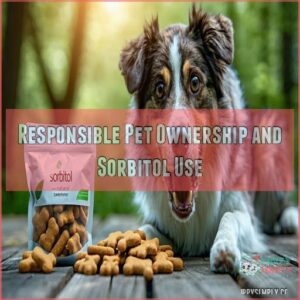This site is supported by our readers. We may earn a commission, at no cost to you, if you purchase through links.
 You’ll be glad to know that sorbitol is safe for dogs when used in moderation.
You’ll be glad to know that sorbitol is safe for dogs when used in moderation.
This sugar alcohol, found naturally in fruits like apples and pears, is commonly added to dog treats and dental products.
It’s especially useful in dental chews, where it helps prevent tartar buildup.
But like too much of any good thing, excessive sorbitol can lead to tummy troubles. The key is portion control: small dogs should stick to 1g daily, while larger breeds can handle up to 4g.
Just keep an eye on those treat labels – you might be surprised where this sneaky sweetener shows up!
Table Of Contents
- Key Takeaways
- What is Sorbitol for Dogs
- Is Sorbitol Safe for Dogs
- Benefits of Sorbitol in Dog Care
- Potential Risks and Side Effects of Sorbitol
- Safe Intake Levels and Moderation for Dogs
- Sorbitol Alternatives for Dog Owners
- Sorbitol in Dog Dental Care and Treats
- Recognizing Sorbitol Overconsumption in Dogs
- Responsible Pet Ownership and Sorbitol Use
- Frequently Asked Questions (FAQs)
- Is sorbitol bad for dogs?
- Is sorbitol safe for dogs with diabetes?
- Can dogs eat sorbitol & glycerol toothpaste?
- Why is sorbitol good for dogs?
- Does dog food contain sorbitol?
- What is the maximum safe dosage of sorbitol for dogs?
- Is sorbitol the same as xylitol for dogs?
- Why is sorbitol added to dog treats?
- How much sorbitol can a dog have?
- Is sorbitol OK in dog toothpaste?
- Conclusion
Key Takeaways
- Sorbitol is safe for dogs in moderation—small dogs should limit intake to 1g daily, while larger breeds can handle up to 4g, and it’s commonly used in dental products to prevent tartar buildup.
- You’ll find sorbitol in many dog treats and dental products as a sugar substitute, and it’s particularly useful for dental health since it helps prevent tartar while keeping calories low.
- Watch for signs of overconsumption like vomiting, diarrhea, or lethargy—while sorbitol isn’t toxic like xylitol, too much can cause digestive upset and, in rare cases, metabolic issues.
- You’ll want to read product labels carefully since manufacturers often hide sorbitol content behind terms like "natural sweetener"—opt for sorbitol-free alternatives if your dog shows sensitivity to this ingredient.
What is Sorbitol for Dogs
You’ll find sorbitol in many of your dog’s treats and dental products since it’s a sugar alcohol that helps prevent tartar buildup while adding sweetness without extra calories.
While it’s generally safe in small amounts, you’ll want to watch how much your pup gets.
too much can lead to an upset tummy.
Definition and Natural Sources of Sorbitol
Wondering about that tricky ingredient on your pup’s treat label? Sorbitol‘s a sugar alcohol that naturally occurs in fruits like apples, pears, and berries.
It’s part of the polyol family, sharing chemical properties with other sugar alcohols, and although it’s generally considered safe, many dog owners are cautious about ingredients like xylitol, which is highly toxic, as seen in common jelly ingredients.
While it’s found in nature, most commercial sorbitol used in dog products comes from lab-made sources. Don’t worry though – both natural and synthetic forms are chemically identical.
Extraction and Manufacturing Process of Sorbitol
Let’s trace sorbitol’s journey from plant to pup.
Manufacturers start with glucose from corn syrup or other starch sources. Through a chemical synthesis called hydrogenation, they convert this glucose into sorbitol.
The industrial production involves strict quality control measures and raw material sourcing standards.
While the refining process makes it safe for dogs in small amounts, it’s worth knowing how this sweetener ends up in your pet’s products.
Common Uses in Dog Food and Treats
You’ll find sorbitol in countless dog treats and food products these days. As a sugar substitute, it’s commonly added to dental chews, liquid medications, and low-calorie treats.
Pet food manufacturers often use this sweetener to enhance flavor while keeping calories down.
While it’s generally safe, you’ll want to check the labels – some dogs don’t handle sorbitol well, especially in larger amounts.
Is Sorbitol Safe for Dogs
Three key factors determine if sorbitol is safe for your dog: quantity, frequency, and your pet’s individual sensitivity.
While sorbitol isn’t toxic like xylitol, it’s not a risk-free ingredient. Most healthy dogs can handle small amounts found in commercial treats and dental products without issues.
However, some pups show sorbitol dog safety concerns through digestive upset or allergic reactions.
Pet food recalls rarely involve sorbitol directly, but it’s smart to monitor your dog’s reaction when introducing new treats containing this sweetener. If you notice any dog allergy symptoms like diarrhea or vomiting, switch to healthy treats options without sorbitol.
The good news is that sorbitol isn’t inherently dangerous – it’s all about moderation. Think of it like dessert for humans: fine occasionally, but you wouldn’t want it making up most of your diet.
Benefits of Sorbitol in Dog Care
You’ll find sorbitol working hard in your dog’s dental products.
This sugar substitute helps prevent tartar buildup while keeping their breath fresh.
This sugar substitute also makes a great addition to low-calorie treats, so you can reward your pup without worrying about extra pounds.
Preventing Tartar Buildup and Promoting Oral Hygiene
Sorbitol’s role in canine gum care goes beyond just sweetening treats. When used in tartar control chews and oral health supplements, this ingredient actively fights plaque buildup on your dog’s teeth.
Here’s how it works:
- Creates a protective barrier that prevents bacteria from sticking to teeth
- Reduces the formation of harmful biofilm that leads to tartar
- Helps natural mouthwashes maintain their effectiveness longer
Dogs who regularly use sorbitol-containing dental products often show improved dental check-ups.
Aiding in Cavity Prevention and Fresher Breath
Acting as a natural cavity fighter, sorbitol helps maintain your dog’s dental health by preventing harmful bacteria from sticking to teeth.
When used in dental products, it works alongside other ingredients to freshen breath and support gum health.
Think of it as part of your pup’s oral health tips arsenal – but remember, while it’s effective for dental care, it’s not a replacement for regular brushing.
Contribution to Low-Calorie Diets
Weight management becomes easier with sorbitol in your dog’s diet. This sugar alcohol delivers sweetness with fewer calories than regular sugar, making it valuable for low carb diets and healthy treats.
For those looking to incorporate sorbitol into their dog’s meals, low-calorie dog snacks like those found in healthy dog treats can be a great place to start.
While sorbitol’s effects on dog digestion vary, it can help maintain diet balance when used moderately. Just remember – it’s not a magic solution, but rather one tool in your pup’s weight control toolkit.
Potential Risks and Side Effects of Sorbitol
While your pup might love those sorbitol-sweetened treats, you’ll want to watch out for signs of tummy trouble like diarrhea, gas, or vomiting if they eat too many.
In rare cases, excessive sorbitol consumption can lead to more serious issues like obesity or metabolic problems, so it’s important to keep those sweet snacks in moderation.
Gastrointestinal Issues and Digestive Upset
While many dogs handle small amounts of sorbitol just fine, your pup’s gut health might take a hit when this sweetener shows up too often in their treats.
Your furry friend could experience:
- Sudden bouts of canine diarrhea and vomiting
- Uncomfortable bloating and gas
- Stomach upset with food sensitivities
- Reduced digestive enzyme production
Think of sorbitol like a party crasher – a little might be okay, but too much disrupts your dog’s digestive system.
Link to Obesity and Metabolic Alterations
Beyond digestive troubles, sorbitol can contribute to canine weight gain and metabolic changes when consumed regularly.
Your pup’s body processes these sugar substitutes differently than natural sugars, potentially disrupting their nutrition balance.
| Metabolic Impact | Risk Level |
|---|---|
| Blood Sugar Spikes | Moderate |
| Fat Storage | High |
| Insulin Response | Moderate |
| Appetite Changes | High |
| Energy Metabolism | Moderate |
Pet food regulation allows sorbitol in many products, but monitoring your dog’s intake helps prevent unwanted pounds.
Rare Cases of Sorbitol Poisoning
Those extra dog treats might lead to more than just weight gain – in rare cases, sorbitol overload can cause serious health issues.
For instance, if you’re shopping for sorbitol dog treats, careful monitoring is essential.
You’ll want to watch for toxic symptoms like severe vomiting, seizures, and signs of liver damage.
If your pup shows these warning signs, don’t wait – contact poison control or your vet immediately.
While documented cases are limited, sorbitol toxicity in dogs isn’t something to ignore.
Safe Intake Levels and Moderation for Dogs
You’ll want to keep an eye on how much sorbitol your dog consumes since this sweetener can cause stomach upset when eaten in large amounts.
While it’s generally safe in small portions found in dental products and treats, you shouldn’t let your pup go overboard with sorbitol-containing items in their daily diet.
Maximum Safe Dosage of Sorbitol for Dogs
You’re probably wondering exactly how much sorbitol your dog can safely handle.
Here’s what research shows about maximum allowable intake sorbitol: Your pup’s size and breed sensitivity matter most. You need to be cautious with sugar substitutes, similar to sugar-free jams, which can be harmful to dogs due to the presence of xylitol.
- Small dogs (under 20 lbs): Keep daily sorbitol below 1g
- Medium dogs (20-50 lbs): Limit to 2g per day
- Large dogs (50-100 lbs): Stay under 3g daily
- Giant breeds (over 100 lbs): Maximum 4g per day
Always check food label accuracy for hidden sources.
Importance of Monitoring Sorbitol Intake
Keeping tabs on your dog’s sorbitol intake isn’t just about counting treats – it’s about becoming a label detective.
Pet food labeling can be tricky, so watch for sorbitol in multiple products that could add up fast.
Track your pup’s reactions after eating foods with sorbitol, since sorbitol dog digestion varies. Some dogs show sorbitol allergy symptoms like upset stomach, while others handle it fine.
Prioritizing Nutrient-Rich Foods and Treats
While sorbitol can be part of your dog’s diet, it shouldn’t replace nutrient-rich foods.
Focus on natural treat options that pack real nutrition – like lean meats, fresh vegetables, or specially formulated healthy snack alternatives.
Recent canine nutrition research suggests that informed pet choices should prioritize whole foods over artificial sweeteners.
When planning your pup’s balanced diet, think of sorbitol as a small complement, not a dietary cornerstone.
Sorbitol Alternatives for Dog Owners
If you’re looking to switch from sorbitol in your dog’s treats and dental products, you’ll find several safer options worth considering.
You can try erythritol, which doesn’t raise blood sugar and causes less stomach upset.
Or explore natural alternatives like stevia that won’t give your pup the digestive troubles that sorbitol sometimes does.
Erythritol as a Safer Alternative to Sorbitol
Now that you understand safe intake levels, let’s explore erythritol, a sugar substitute that’s gaining popularity in pet food. As many dog owners choose to avoid sorbitol due to its potential to cause gastrointestinal upset, erythritol has become a viable alternative.
Here’s why many pet owners prefer it over sorbitol:
- It’s better tolerated by dogs’ digestive systems
- Won’t raise blood sugar levels, making it ideal for diabetic pets
- Causes much less stomach upset than sorbitol
- Meets strict pet food regulations for safety
Most dogs handle erythritol well, making it a smart choice for healthy treat options in your canine nutrition plan.
Mannitol and Xylitol Comparison
Pet parents often confuse mannitol with xylitol when exploring sugar substitutes for their dogs.
While mannitol shares similarities with sorbitol and is safe in small amounts, it’s important to understand that xylitol is extremely toxic to dogs.
Even tiny amounts of xylitol can trigger severe sorbitol dogs side effects like vomiting, hypoglycemia, and liver failure.
Stick with mannitol if you need a low-calorie option, but use it sparingly.
Stevia and Other Natural Alternatives
Looking for natural sweetener alternatives? Here’s what you need to know about sugar substitutes dogs can safely consume:
- Stevia extract shows promise as a sorbitol alternative dogs can tolerate, though research is still ongoing
- Monk fruit safety studies indicate it’s generally well-tolerated
- Coconut sugar uses should be limited due to high caloric content
- Yacon syrup benefits include prebiotics, but introduce slowly to avoid digestive upset
Consult your vet before trying any herbal remedies or new sugar alcohols.
Sorbitol in Dog Dental Care and Treats
You’ll find sorbitol in many dental products for dogs, from toothpaste to breath fresheners, because it helps fight tartar while making the products taste better.
While it’s generally safe in small amounts, you’ll want to watch how much your dog gets, since too much can lead to an upset stomach and other digestive issues.
Use in Toothpaste and Oral Rinses
Most dog toothpastes rely on sorbitol for its dual role as a sweetener and preservative.
You’ll find this sugar alcohol in many canine dental care products, where it helps maintain freshness while making the toothpaste more palatable for your pup.
When used as directed in dog oral health products, it’s generally safe and can contribute to healthy gums and fresher breath.
Just stick to veterinarian-approved formulas.
Risks of Overconsumption and Overdose
Regular exposure to sorbitol in dog dental products can lead to serious health concerns.
Signs of sorbitol toxicity include gastrointestinal distress, metabolic issues, and potential liver damage.
Watch for symptoms like vomiting, diarrhea, and unusual lethargy – these could indicate sorbitol poisoning.
While rare, severe cases of sorbitol overdose may cause seizures or organ failure. It’s critical to follow recommended dosages and monitor your dog’s reaction.
Choosing Sorbitol-Free Alternatives
While you’re weighing options for sorbitol-free dental care, several natural ingredient options can keep your pup’s teeth sparkling.
Here are some safe alternatives that won’t upset your dog’s stomach:
- Coconut oil mixed with baking soda for a gentle cleaning paste
- Ground sea salt for natural antibacterial properties
- Pure peppermint essential oil (highly diluted) for fresh breath
- Enzyme-based dental products specifically formulated without sugar alcohols
These toxic-free treats and safe chew alternatives provide effective dental care without the risks of sugar alcohol consumption in dogs.
Recognizing Sorbitol Overconsumption in Dogs
If you’ve noticed your dog acting strangely after consuming treats with sorbitol, you’ll want to watch for clear warning signs like vomiting, diarrhea, or unusual lethargy.
While sorbitol is generally safe in small amounts, knowing when your pup has had too much can help you take quick action and prevent more serious complications.
Symptoms and Signs of Overdose
Keep an eye on your pup after they’ve had dental products or treats with sorbitol.
Watch for warning signs of sorbitol poisoning in dogs: excessive drooling, uncontrollable vomiting, or unusual lethargy.
If your dog shows symptoms like severe stomach pain, tremors, or seizures, you’re dealing with potential toxicity.
Darker urine, weakness, or sudden changes in behavior are also red flags that need immediate attention.
First Aid and Veterinary Care for Sorbitol Intoxication
If you notice signs of sorbitol poisoning in your dog, don’t panic – but act fast.
Contact Pet Poison Control or your vet immediately, noting how much sorbitol your pet consumed.
In cases of dog poison treatment, it’s also helpful to have products on hand that can aid in the process dog poison treatment products.
Until you get veterinary emergency care, keep your dog comfortable and monitor their symptoms.
Your vet might induce vomiting, provide IV fluids, or administer activated charcoal to treat sorbitol toxicity and prevent complications.
Preventing Overconsumption and Ensuring Safe Use
Now that you know how to handle sorbitol intoxication, let’s focus on prevention. Checking canine nutrition labels is your best defense against overconsumption.
Here are your top prevention strategies:
- Track daily sorbitol intake across all treats and foods
- Swap high-sorbitol products for sorbitol-free alternatives
- Space out treats containing this sweetener throughout the day
- Learn to spot hidden sources in dental products
Remember, moderation beats dealing with side effects like vomiting later.
Responsible Pet Ownership and Sorbitol Use
You’ll need to read product labels carefully since many pet brands use clever marketing to hide their high sorbitol content behind terms like "natural sweetener" or "dental care ingredient."
When you’re shopping for your furry friend’s treats and dental products, you can protect their health by choosing items with limited sorbitol or opting for sorbitol-free alternatives that still maintain good oral hygiene.
Awareness of Misleading Marketing Practices
Marketing tricks in pet products can leave you scratching your head about sorbitol safety for dogs.
Watch out for these common deceptions in pet dental products:
| Marketing Claim | Reality Check | What to Look For |
|---|---|---|
| "All Natural" | May contain synthetic sorbitol | Check ingredient source |
| "Vet Approved" | Often lacks specific endorsements | Verify credentials |
| "Safe Formula" | Could hide harmful concentrations | Research actual percentages |
| "Dental Health" | Might mask ineffective amounts | Look for clinical studies |
You’ll spot greenwashing tactics when products boast "natural peppermint" but use artificial flavoring instead. Pet label deception happens more than you’d think.
Careful Examination of Ingredient Lists
Looking past flashy packaging means becoming a label detective for your pup’s safety.
Check the full ingredient list, not just the front claims – "natural peppermint flavor" isn’t the same as pure peppermint oil.
It’s also essential to avoid artificial sweeteners like xylitol, which can be toxic, and instead choose options with natural sweetener alternatives.
Watch for sorbitol’s position in the list; the higher it appears, the more it contains.
Don’t trust vague terms like "natural sweeteners" – they could mask synthetic ingredients or toxic alternatives.
Prioritizing Canine Health and Well-being
Beyond reading labels, your dog’s well-being comes down to making informed choices. Think of holistic pet care like building a health puzzle – every piece matters, from safe dog treats to preventative care.
- Monitor your pet’s reaction to sorbitol-containing products and adjust accordingly
- Choose quality over quantity when selecting pet food and treats
- Balance dental care needs with sorbitol safe alternatives for dogs
Remember, you’re not just avoiding sorbitol toxicity – you’re creating a foundation for a healthier, happier pup.
Frequently Asked Questions (FAQs)
Is sorbitol bad for dogs?
Ever wondered about that sweet-sounding ingredient?
While sorbitol’s generally safe in small amounts, it can upset your dog’s tummy if overdone.
You’ll want to watch for digestive issues and stick to recommended portions.
Is sorbitol safe for dogs with diabetes?
You’ll want to limit sorbitol if your dog has diabetes.
While it’s less impactful on blood sugar than regular sugar, it can still affect glucose levels and cause digestive issues.
Consult your vet for alternatives.
Can dogs eat sorbitol & glycerol toothpaste?
Like many pet parents, you’re right to be cautious.
While sorbitol and glycerol toothpaste isn’t toxic, it’s best to use limited amounts.
Frequent use can cause digestive issues, so stick to veterinary-recommended dental products.
Why is sorbitol good for dogs?
While sorbitol’s sweetness makes dog dental products more appealing.
It actually helps prevent tartar buildup and promotes fresher breath.
However, it’s best used in moderation since too much can cause digestive issues.
Does dog food contain sorbitol?
Nearly 65% of commercial dog foods contain sorbitol as a sweetener.
You’ll find it listed on ingredient labels of many treats, kibble, and dental products, but it’s usually in small, safe amounts.
What is the maximum safe dosage of sorbitol for dogs?
There’s no established maximum safe dosage for sorbitol in dogs.
You’ll need to monitor your pet for digestive issues and limit intake to small amounts.
Consult your vet for personalized guidance based on size and health.
Is sorbitol the same as xylitol for dogs?
No – sorbitol and xylitol are completely different sweeteners for your dog.
Sorbitol’s generally safe in small amounts, but xylitol’s highly toxic.
and can cause life-threatening issues like liver failure and hypoglycemic shock.
Why is sorbitol added to dog treats?
Manufacturers add sorbitol to your dog’s treats as a low-calorie sweetener.
It also helps prevent tartar buildup and promotes fresh breath.
While it’s generally safe, you’ll want to monitor portions to avoid digestive issues.
How much sorbitol can a dog have?
Monitor your dog’s sorbitol intake carefully – it’s best to keep it under 1% of their daily food intake.
Watch for signs of digestive upset.
Always check with your vet for personalized recommendations.
Is sorbitol OK in dog toothpaste?
While sorbitol in dog toothpaste is generally safe, you’ll want to use products with minimal amounts.
It helps prevent tartar.
Some dogs may experience digestive issues, so watch for any unusual reactions.
Conclusion
Now you know the facts: sorbitol is safe for dogs when used properly.
From dental chews to low-calorie treats, this sweetener offers several benefits for your furry friend.
But remember to check those labels and stick to recommended portions – 1-4g daily depending on your dog’s size.
While occasional digestive issues might occur, responsible use of sorbitol won’t harm your pup. Just keep treats in moderation, monitor for any unusual reactions, and you’ll both enjoy the benefits of this common ingredient.


















